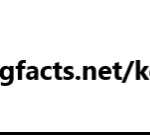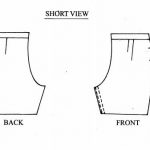KNEC KCSE Past Papers Art and Design 2014
KCSE Past Papers Art and Design 2014
3.14.1 Art & Design Paper 1 (442/1)
SECTION A (20 marks)
Answer ALL the questions in this section in the spaces provided.
1 (a) Study the composition below.

Identify the two most outstanding elements and one principle conveyed in the composition.(3 marks)
(b)Explain the tenn “pendant” with reference to ornaments.(2 marks)
(c) Give two basic reasons for decorating fabrics.(2 marks)
(d) What is the difference between human figure drawing and portraiture?(2 marks)
(e) State two reasons why a fabric may be crumpled, twisted or plaited when using it to create a collage.(2 marks)
(f) Study the print below.
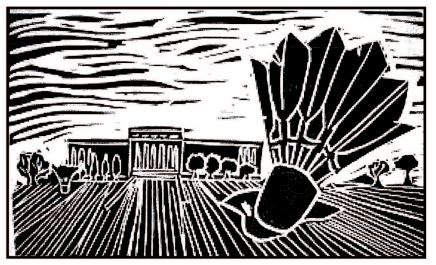
Name the printing technique used to produce it.(1 mark)
(g) Explain the term “priming” and state its function in painting.(2 marks)
(h)Identify the visual symbol illustrated above and state its function.(2 marks)
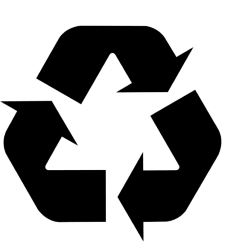
(i) Distinguish between the terms hue and pigment.(2 marks)
(j)Identify the type face represented by the letter above and name the part labelled X.
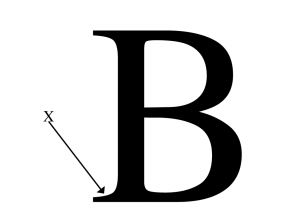
SECTION B (25 marks)
Answer ALL the questions from this section in the spaces provided. below.
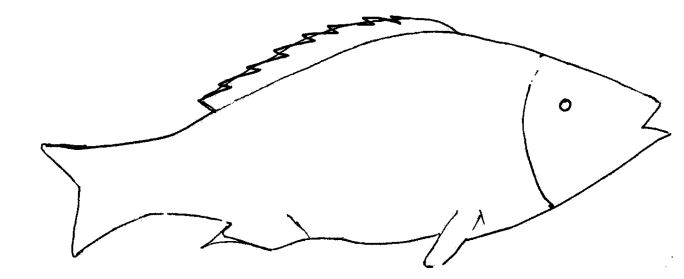
2 Using the stippling technique, create three dimensional effect on the font illustrated (4 marks)
3 The illustration below represents a process in the production of an artwork.
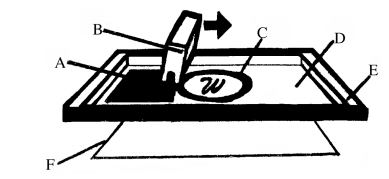
Name the pans labelled A-F and classify them under materials, tools and equipment. (6 marks)
4 Explain the following techniques of decorating clay articles:
(a) incising;(1 mark)
(b) Slip trailing;(1 mark)
(0) Inlaying;(1 mark)
(d) Excising;(1 mark)
(e) S graffito;(1 mark)
5 In the space provided, create an inverse repeat pattern using the motif below.(5 marks)
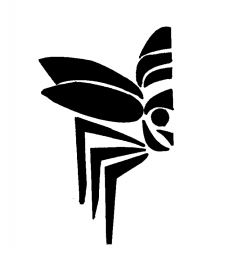
6 Read the following statement and rewrite it in calligraphic lettering in the box below.(5 marks)
“A noble character is not inherited,
It is earned by individual effort”.
SECTION C (15 marks)
Answer any ONE question from this section.
Write your answers in the space provided after question 9.
7 (a) Name the structure illustrated below and state the material used to construct it.(3 marks)
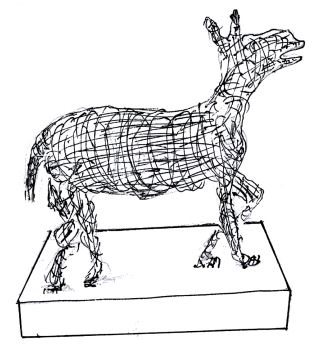
(b) Describe how you would use the structure to make a form in “papier mache”. (12 marks)
8 (b) What is a badge? (1 mark)
(b) Name and explain four components of a badge. (12 marks)
(c) State two functions of colour in a badge. (2 marks)
9 (a) With the aid of a labelled illustration describe the term ‘waisting’ in reference to weaving. (4 marks)
(b) Explain four ways of achieving firmness of yarn in a mat made using the ghiordes knot. (8 marks)
(c) State three main ways of finishing a woven mat. (3 marks)
3.14.2 Art & Design Paper 2 Practical (442/2)
Answer only ONE question chosen from EITHER alternative A OR alternative B.
ALTERNATIVE A: DRAWING OR PAINTING
You are instructed that the use of rulers and other mechanical devices is forbidden in this alternative.
EITHER
DRAWING
1 Create a close-up drawing depicting a small boy and girl joyfully playing with pebbles. The Working area is 35cm by 45cm.
OR
PAINTING
2 Create a pictorial composition based on the following description:
It is the end of a busy market day. Passengers of different ages are struggling to be the first to board the only home bound public service vehicle on the route.
The composition should be in an area of 35cm by 45cm.
ALTERNATIVE B: GRAPHIC DESIGN
You are instructed that the use of rulers and other mechanical devices as well as tracing paper is allowed. The colour of the working surface (paper) will not be considered as one of the colours required in any question.
EITHER
3 The Ministry of Health has embarked on a mission to enlighten the public about Drug and Substance Abuse.
In three colours, design a poster Warning the public against Drug and Substance Abuse. The Work should be within an area of 35cm by 45cm.
OR
4 “Trendy – tex” a company dealing with production of unisex clothing requires a logo, letterhead and an envelope.
In an area measuring 35cm by 45cm and in three colours, design a:
(a) Logo measuring 9cm by 9cm.
(b) Letterhead measuring 30cm by 21cm.
(c) Envelope measuring 25cm by 17cm.
KCSE Past Papers Art and Design 2014
4.14.1 Art & Design Paper 1 (442/1)
SECTION A (20 marks)
1. (a)Texture and line. 2 marks
Rhythm/movement 1 mark
3 marks
(b)A hanging ornamental object suspended from a necklace or earring. 2 marks
(c)(i) To enhance the aesthetic value of the fabric.
(ii) Acts as a symbol/ identity of status role.
(iii) To add economic value to the fabric.
(iv) Communication through pictorial symbols/colour and words.
Any two, 1 mark each = 2 marks
(d)Human figure drawing is the depiction of a human form, Whereas portraiture is a close study / rendition of the characteristics of a specific person from the head to torso/ shoulder. 2 marks
(e)(i) To create textural effect.
(ii) To define form.
(ii) Ti create three dimensional effect.
Any two points 1 mark each. 2 marks
(f)Block printing / Relief printing (wood block/linoleum). 1 mark
(g) (i) Coating a surface/canvas/fabric with undercoat or primer in preparation for painting. 1 mark
(ii) Function:
‘ To reduce absorption.
‘ To stabilize the painting surface/make it stiff or firm/isolates the support
(canvas) from damaging ingredients in the paint hence preventing disintegration of the canvas.
‘ Provides a smooth surface that accepts the paint, letting the paint brush flow better thus adequate adhesion.
Any 1 x 1 : 1 mark
(h)Eco environment recycle symbol. 1 mark
Function:
– Re-use/recycle materials.
– To create awareness on proper use of the environment.
Any 1 x 1=1 mark
(i) – Hue is another name for colour, used to differentiate one colour from another/it’s the attribute of a colour by virtue of Which it is discernible as red, green, blue etc.
– Pigment is a natural colouring matter, a powder which is mixed with a solvent (binder) to make paint.
2 marks
(j) Type face: Roman letter.
Part labelled X is Serif. 2 marks
SECTION B (25 marks)
2
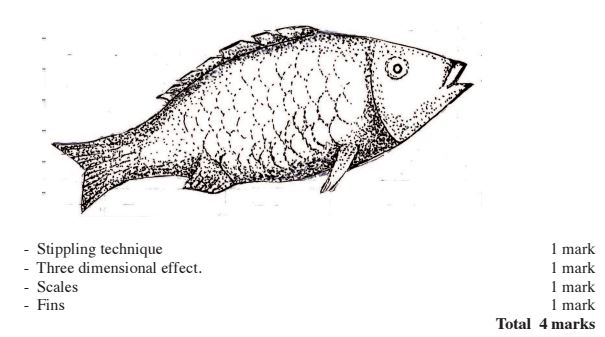
– Stippling technique 1 mark
– Three dimensional effect. 1 mark
– Scales 1 mark
– Fins 1 mark
Total 4 marks
3.

6 marks
4. (a) Incising: Carving/cutting grooves/shapes slightly to create patterns.
(b) Slip trailing: Application of coloured slip onto an object, then scratch to create designs,
(c) Inlaying: To set decorative pieces on clay into a clay surface to make a design that is usually level with the surface.
(d) Excising: cut out/through patterns/designs.
(e) Sgraffito: Scratch the design on the surface and then apply coloured slip. 5 marks
5.
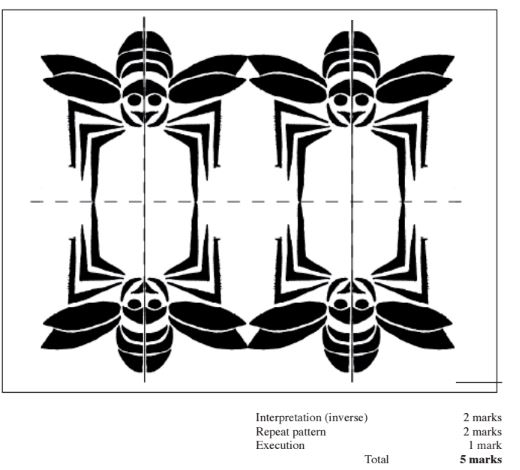
6. (i) Interpretation
– Calligraphic characteristics.
– Creativity and aesthetics. 2 marks
Interpretation (inverse) 2 marks
Repeat pattern 2 marks
Execution 1 mark
(ii) Legibility and readability of letters:
– Uniformity of letters.
– Spacing between letters, words and lines
Total 5 marks
SECTION C (15 marks)
7. (a) (i) Armature: a sculpture framework for supporting the clay or other plastic material in modelling. 2 marks
(ii) Made using thin wire. 1 mark
3 marks
(b) (b) Process of making a form in “papier mache”.
(i)Collect the required materials, tools and equipment.
(ii)Cut /tear/shred the paper into small pieces.
(ii)Soak in water and leave it to soften and set for at least 3 days.
(iii)Drain the water and add glue or cold water paste.
(iv)Pound into a homogenous pulp/state.
(v)Apply the pulp in small amounts on to the structure until the entire form is covered.
(vi)Keep building up the form until the desired form/shape is achieved.
(viii)Add details to define the form/shape.
(iX)Refine the details/structure.
(X)Leave to dry under shade and ensure that it is completely dry.
(Xi)Apply the desired colour and leave to dry.
(Xii)Apply finish: clear vanish and leave to dry.
Each step 1 x 12 = 12 marks
8. (a)A badge is an identification symbol worn to show membership to a group/organization/ institution, society/rank/position/status/achievement. 1 mark
(b) Components of a badge:
(i)Shield:
Main body/overall form/layout of a badge on which the components are arranged/attached (usually oval/round/circular etc).
(ii)Identification symbol:
Contains the name and pictorial representation of the institution/rank/status etc.
(iii)Ribbon/wreath:
A decorative or beautifully designed section of the badge which bears the motto.
(iv)Motto :
A short phrase stating the core values, aspirations or beliefs of an institution.
Stating = 1 mark
Explanation 2 x 4 = 8 marks
(c) Colour function in a badge:
(i) Aesthetic appeal.
(ii) Identification.
(iii) A symbolic value of what the institution stands for or supports the motto.
Any 2 x 1 : 2 marks
9. (a) Waisting is a defect in a woven article caused by uneven tension of yarn ie. loose warps or tight wefts.
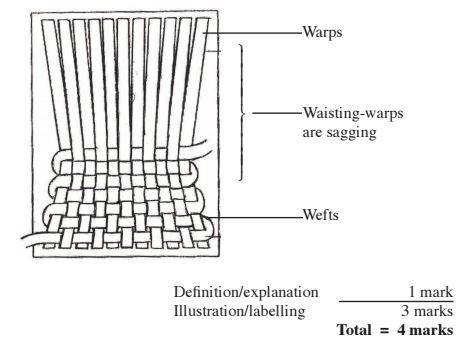
(b) Four ways of achieving firmness of yarn.
(i) Using thick yarn instead of thin yarn.
(ii) Firmly tying the warp threads to avoid sagging.
(m) Allowing minimum spacing between the warps.
(iv) Using plain weave after each row of ghiordes knots.
(v) Pulling the weft threads firmly at the end of each woven line.
(vi) Beating down firmly the weft threads after every row.
Any 4 x 2 marks each = 8 marks
(c) Three main ways of finishing a woven mat.
(i) Knotting the warps/fringes.
(ii) Sewing the warps/overcasting/binding.
(m) Hemming warps/folding and hemming down.
1 x 3 = 3 marks
4.14.1 Art & Design Paper 2 (442/2)
ALTERNATIVE A: DRAWING/PAINTING
QUESTIONS 1 & 2
1 . INTERPRETATION
(i) Relevance of subject matter to theme 08
(ii) Appropriatness of mood/atmosphere 04
(ii) Correct dimensions (measurements) 02
(14 marks)
2. COMPOSITION
(i) Appropriate use of space 04
(ii) Appropriate format 02
(iii) Unity/rhythm/balance 08
(iv) Originality/creativity/imagination/ 08
(v) Close-up/focal point (Dominance) 08
(30 marks)
3. FORM/ STRUCTURE
(i) Definition of forms 08
(ii) Capture of actions/mood 08
(iii) Articulation of posture and features 06
(iv) Proportions of forms in relation to each other and whole 06
(v) Texture/pattern 06
(32 marks)
4. TONE/COLOUR
(i) Tonal value to create volume/depth 06
(ii) Harmony/contrast 04
(iii) Competency in use of media (workmanship) 04
(iv) Appropriateness to subject matter 02
(20 marks) 5. PRESENTATION
(i) Neatness 02
(ii) Appropriate finish 14
(4 marks)
TOTAL 100 MARKS
ALTERNATIVE B: GRAPHIC DESIGN
QUESTIONS 3 & 4
1. INTERPRETATION
(i) Subject matter: Requirements: correct information- contents of letterhead/envelope/poster/logo 08
(ii) Correct dimensions 02
(iii) Appropriate format 02
(iv) Mood/symbolism in relation to subject matter 04
(16 marks)
2. COMPOSITION
(i) Layout of pictorial forms/letters 08
(ii) Spacing of letters, Words and lines 10
(iii) Originality/creativity/imagination 10
(iv) Rhythm/unity/balance 04
(32 marks)
3. FORM/ STRUCTURE
(i) Definition of forms (pictorial/letters)12
(ii) Proportion of forms (pictorial/letters) 10 in relation to each other and Whole
(iii) Appropriateness of forms/(pictorial/letters to function. 08
(30 marks)
4. COLOUR
(i) Appropriate colour 06
(ii) Harmony/contrast 06
(12 marks)
5. PROFESSIONAL SKILLS
(i) Precision 06
(ii) Neatness 02 (m) Presentation/finish 02
(10 marks)
TOTAL 100 MARKS
